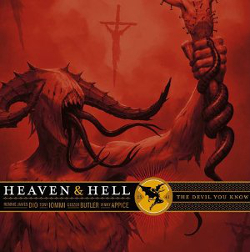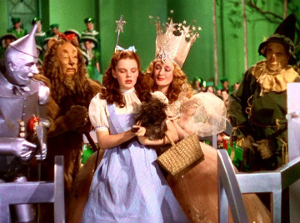Sundry & Motley
As of November & the Collapse of the Republic
Friday, November 6, 2020 12:37 am
Looks like I missed October's update. Sorry. I know no one reads this blog anyhow. If you do, I apologize for doubting your existence.
I sold another story, this one to Cirsova. Not The Impossible Footprint, which, as you may recall, was pre-emptively rejected because of its length. Instead, having decided not to give up on contributing to Cirsova for 2021, I whipped up a 1,200-word short called Dead Neighbor, which Alex the editor bought. So that's nice!
I sold another story, this one to Cirsova. Not The Impossible Footprint, which, as you may recall, was pre-emptively rejected because of its length. Instead, having decided not to give up on contributing to Cirsova for 2021, I whipped up a 1,200-word short called Dead Neighbor, which Alex the editor bought. So that's nice!
Devils I Used to Know
A Rediscovery of an Old Band
Thursday, October 22, 2020 11:44 am
As a teenage metalhead, of course I listened to Black Sabbath. Never quite loved them, though. When I was in college, Dio Sabbath (i.e., Black Sabbath fronted by vocalist Ronnie James Dio) came out with the albums "Heaven and Hell" and "Mob Rules," both of which I loved. Then I fell off Sabbath again. And got old.
Recently I learned (from RazorFist's YouTube series "Metal Mythos") that Dio Sabbath, calling itself "Heaven & Hell" (because Ozzy Osbourne, their original vocalist, had legally blocked the "Black Sabbath" name), released an album in 2009, called "The Devil You Know." Of the Dio albums, it is now my favorite. The Sabbalicious track "Follow the Tears" simply... pounds.

Yes, I am a traditional Catholic, and yes, I have listened to a fair amount of "Satanic" metal. Make of that what you will. While holding no brief for Satan, I must say that Catholicism has always been a bit metal. Eating the body and blood of your God is not for the weak-kneed.
P.S. Apparently there was a fourth Sort-of-Dio Sabbath album, released in 1992. Missed that one, too. However, given RazorFist's discussion of it, it does not attract me.
Recently I learned (from RazorFist's YouTube series "Metal Mythos") that Dio Sabbath, calling itself "Heaven & Hell" (because Ozzy Osbourne, their original vocalist, had legally blocked the "Black Sabbath" name), released an album in 2009, called "The Devil You Know." Of the Dio albums, it is now my favorite. The Sabbalicious track "Follow the Tears" simply... pounds.

Yes, I am a traditional Catholic, and yes, I have listened to a fair amount of "Satanic" metal. Make of that what you will. While holding no brief for Satan, I must say that Catholicism has always been a bit metal. Eating the body and blood of your God is not for the weak-kneed.
P.S. Apparently there was a fourth Sort-of-Dio Sabbath album, released in 1992. Missed that one, too. However, given RazorFist's discussion of it, it does not attract me.
Close to the Heart
On the Occasion of Neil Peart's Death
Thursday, February 6, 2020 3:26 pm
While it is not unreasonable to wonder about the life of an artist — or even to admire an artist's everyday conduct — I am of the mind that the artist does not matter (beyond his getting the proper credit and payment). To be sure, his life is relevant insofar as it clarifies his work; but other than that...
Most artists are scum. Beethoven was a bitter bastard. Shostakovich was a pathetic collaborator. As men, neither merits celebration. Celebrity for artists should be rejected. Go ahead and admire Haydn because he was kind, pious, and hard-working; then pity and decry him because he was adulterous; but remember that there were many kind, pious, hard-working, and adulterous men in the world. It was not Haydn's life that distinguished him; and it is not his life that should concern us.
Most artists are scum. Beethoven was a bitter bastard. Shostakovich was a pathetic collaborator. As men, neither merits celebration. Celebrity for artists should be rejected. Go ahead and admire Haydn because he was kind, pious, and hard-working; then pity and decry him because he was adulterous; but remember that there were many kind, pious, hard-working, and adulterous men in the world. It was not Haydn's life that distinguished him; and it is not his life that should concern us.
Perfect Melancholy
 I was in the open beta for WildStar, an SF MMO, back in 2014. I then subscribed for three months. The game had lots of good in it; but it didn't hold me. Something fundamental was missing. And it was stupid hard. You really couldn't just log in and have fun. And the game's population collapsed so quickly that the open regions were always barren. I was alone in an MMO.
I was in the open beta for WildStar, an SF MMO, back in 2014. I then subscribed for three months. The game had lots of good in it; but it didn't hold me. Something fundamental was missing. And it was stupid hard. You really couldn't just log in and have fun. And the game's population collapsed so quickly that the open regions were always barren. I was alone in an MMO.
An Instrumental That Shouldn't Be Lost
Saturday, September 21, 2019 11:07 pm

That's Where You'll Find Me
 There's a misalignment in The Wizard of Oz.
There's a misalignment in The Wizard of Oz.
What is its moral? "There's no place like home." Dorothy has found herself in a land over the rainbow, and yet her ultimate desire — the fulfillment of which she asks of the Wizard — is to return to Kansas. Near the end, Glinda prompts Dorothy to articulate the lesson that she, Dorothy, has learned; and Dorothy replies:
Maybe Dorothy Sings About the Wrong Thing
Saturday, August 12, 2017 12:19 pm

What is its moral? "There's no place like home." Dorothy has found herself in a land over the rainbow, and yet her ultimate desire — the fulfillment of which she asks of the Wizard — is to return to Kansas. Near the end, Glinda prompts Dorothy to articulate the lesson that she, Dorothy, has learned; and Dorothy replies:
If I ever go looking for my heart's desire, I won't look any futher than my own backyard. Because if it's not there I never lost it to begin with.This lesson, of course, accords with the narrative facts that the Scarecrow, the Tin Man, and the Cowardly Lion each already had the thing he sought. The Scarecrow was already brainy; the Tin Man, full of heart; the Lion, courageous. And Dorothy, in Kansas, already had the place most free of trouble: her home with Aunt Em and Uncle Henry.
Concert After the Fish-Fry
Arvo Pärt's Passio
Sunday, April 9, 2017 10:48 am
I've been listening to Arvo Pärt for quite a while. I'm not sure how I discovered him. He is still alive and still composing. His work, since the 1980s, has been generally focused on the sacred, using chant and polyphony.
I don't know much about music. I know most definitions; I can follow a discussion well enough. But I cannot explain to you the difference between a harmony and a melody — not with understanding. And I cannot distinguish either in a work. I am stupid when it comes to music. Fundamentally I am sub-intellectual. For me, a musical work is either a good noise or it's disposable.
I don't know much about music. I know most definitions; I can follow a discussion well enough. But I cannot explain to you the difference between a harmony and a melody — not with understanding. And I cannot distinguish either in a work. I am stupid when it comes to music. Fundamentally I am sub-intellectual. For me, a musical work is either a good noise or it's disposable.
Superfluous in Heaven
Even Sacred Music Is Mundane
Saturday, February 4, 2017 12:36 am
In the mid '80s, when I was a college boy, I regularly went to the record stores near campus. This was just before CDs and long before MP3s. You wanted music, you flipped through an alphabetized bin and found an LP. Anyhow, one day, while I was browsing for something new, a classical work of some sort started playing on the store stereo. It was beautiful and unfamiliar. I listened for quite a while. I finally asked the clerk what it was. He showed me the sleeve and I went to the proper bin. The LP was in stock. I bought it.
© 2004-25 David Skinner · All rights reserved

